Until the voting age was lowered to 18 in 1971, college students did not register on presidential candidates’ radars. In the ’72 election, millions of young people turned out to exercise their newly-granted suffrage rights. Of course, Richard Nixon was reelected that year and pretty much doomed youth voter turnout for the next three decades. Nevertheless, several candidates over the years have enjoyed huge youth followings, and recently college voters have come to play a crucial role in choosing America’s leader. Here are 10 presidential wannabes who rocked the student vote.
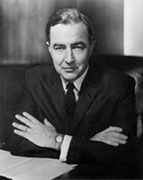
Eugene McCarthy
By 1967, opposition to the Vietnam War was moving from the fringes of the electorate to the middle, and Democrats took note. When Sen. Eugene McCarthy stepped up to challenge incumbent Lyndon Johnson, the man who had gotten the U.S. into the conflict, anti-war college kids rallied behind him. Thousands of long-haired students shaved their heads to be “Clean for Gene” and went door to door in New Hampshire, helping him to win 20 of the 24 delegates from the state. And although he ultimately won more primary votes than any other Democratic candidate, he lost the nomination to Hubert Humphrey because he had fewer electoral college delegates.
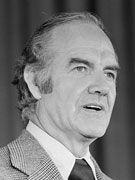
George McGovern
Opposition to the Vietnam War worked a little better for Democrat George McGovern in 1972; he actually won his party’s nomination. Many young voters who had been McCarthy supporters four years earlier migrated to McGovern’s camp, and he made all those millions of newly-minted voters his target bloc. Besides pulling out of Vietnam, he proposed policies like legalizing marijuana and granting amnesty to draft-dodgers. Young people also liked McGovern’s reputation for honesty and fair-dealing. However, the rest of the American public considered McGovern too soft and elected Richard Nixon by a landslide.
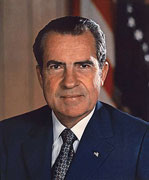
Richard Nixon
With the benefit of hindsight, it seems insane to us that Richard Nixon would have been popular with young people. But contrary to popular belief, not every college kid was anti-war in the ’70s. Nixon actually split the youth vote with McGovern in the 1972 election. Nixon won some over by promising to end the draft. But tens of thousands of young Republicans appreciated Nixon’s hard-line stance against not only the Vietcong, but American anti-war protestors. To these college kids McGovern looked weak, and whatever else you could say about Tricky Dick, no one could claim he was afraid of a fight.
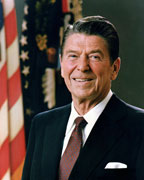
Ronald Reagan
The ’80s represented a surge in the fortunes of the Republican party. A terrible economy under the Democrat Carter had helped Ronald Reagan take office in 1980. In Reagan’s reelection campaign of ’84, voters under 25 approved of him by a 2:1 margin. These young voters were college students and recent college grads who were on their way to making the ’80s the era of the “Me Generation.” Unlike their liberal predecessors, college kids in the ’80s sought a candidate who would reduce federal handouts and regulations that protected poor people and the environment. Reaganomics offered that.
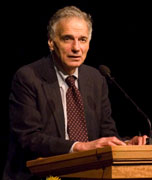
Ralph Nader
Before Occupy Wall Street there was “Nader’s Raiders.” The quintessential Washington outsider has been railing against corporate influence on politics since the ’60s, when his message so inspired college kids that seven law students joined him to investigate the Federal Trade Commission, and thousands more students across the country joined his various organizations to combat nuclear power and protect consumers. He has made an incredible six presidential bids as the Green Party candidate, none of which accomplished anything more significant than possibly robbing Al Gore of an election and handing it to Bush in 2000.
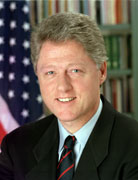
Bill Clinton
Slick Willy went after the college vote in a big way in ’92 and again in ’96. He played his sax on Arsenio Hall, and answered whether he wore boxers or briefs on MTV. In many ways his appeal to youth was similar to Barack Obama’s (see below). Clinton was the third youngest man to ever become president, and his message involved student loan reform, increasing funding to black colleges, and issuing an executive order for environmental protection, all issues important to college kids. In 1996 his efforts paid off; he won 53% of the youth vote and secured reelection.
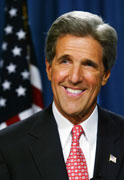
John Kerry
John Kerry’s popularity with college voters was not exactly the kind you hope for when you run for office. Young people saw him as simply the lesser of two evils when it came down to him and George W. Bush. In his first term, President Bush had entered the U.S. in two wars that were already becoming unpopular before the 2004 election, and young people are always the most unfavorable of war. Thus, seeing it as their duty to help the country, that year the number of youth votes quadrupled and Kerry won 54% of them.
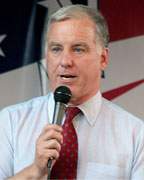
Howard Dean
Before the now-infamous scream killed his chances of being president, Howard Dean had a strong college and youth following. He energized them by visiting college campuses and galvanized them on the Internet for fundraising and spreading Dean-mania. They loved his down-to-earth style that made him seem like a true Washington outsider, a claim every presidential nominee tries to make when the public mood has turned against the current administration. Ultimately though, Dean’s momentum dissolved and many of his young supporters threw their weight behind John Kerry.
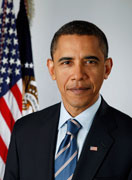
Barack Obama
Never before has a presidential candidate ridden so strong a wave of youth support as Sen. Barack Obama did in 2008. That year saw the second-highest youth voter turnout since 1972, and of those approximately 23 million votes, Obama scored an amazing 68%, the highest-ever tally for the age group. He was young, he was charismatic, he was relatively hip for a politician, and his calls for change were underscored by the fact that he wasn’t another old white guy. Students liked his goals of protecting the environment, closing torture-center Guantanamo Bay, and promoting gay marriage.
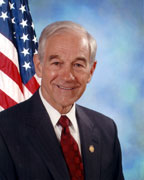
Ron Paul
Who would have thought another old white guy from Texas would be so popular with young voters? Ron Paul is like a cult figure with his rabid following of college kids. He puts out a call on the internet for a “money bomb,” and just like that he’ll have $4 million. Paul wins college voters by being an idealist who calls it like he sees it; students respond to his message, which is admittedly unpolished and often so unflinching that it’s hard to accept. But just like he did in his 2008 presidential run, Paul has been winning the 18-29 vote.
No comments:
Post a Comment